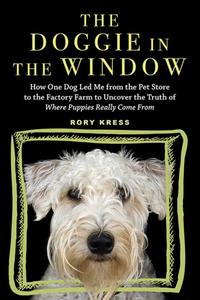
|
|
| photo: Andrea Flanagan Photography | |
Rory Kress is a journalist and Emmy Award-winning television producer. She received her master's degree with honors from the Columbia University Graduate School of Journalism and got her start writing for the Associated Press in Jerusalem. Kress's first book, The Doggie in the Window (reviewed below), is an investigation into the origins of her dog, Izzy.
After buying a dog from a pet store, your journalist nature was piqued by her quirks and you decided to investigate where she came from.
Yes. I was as naïve and foolish as anybody else, and I had no right to be because I am a journalist and this is what I do. I should have been asking more questions than I did, and I take responsibility for that. I ended up tracking back to where my own dog came from and seeing it for myself. It took me a very long time after I physically went there to emotionally connect with where she came from and who she is. It was a place that to me was very, very foreign. It was as alien to me as, gosh, the furthest reaches I've ever traveled to on this planet.
We hear a lot about the horrors of puppy mills--dog-breeding operations in which the health of the animals is disregarded in order to maximize profits--but The Doggie in the Window takes a new perspective on the industry. How so?
I think there's a lot of literature out there about puppy mills and illegal dog breeding. That's all horrible, but where my take on this differs is where we're either being obfuscated by or lied to by our government, and as taxpayers we need to ask better questions. Our consumer dollars really do matter once you follow the money.
The USDA, of all things, is who regulates this. It's such a strange thing to look at my dog and look at a piece of packaged meat I get from the store and say, "Wow, the same agency oversees these two very, very different things." But I almost didn't pick up this topic because so many people have written about it. Then, when I started pulling the thread of the government and the USDA and the regulations and the legal puppy mills and what that means, that's when I became shocked. The more I dug and the more I realized no one was talking about this part of it--government complacency at best, complicity at worst--it was just shocking to me.
An interesting twist transpired while you were writing this book.
I can laugh about it now, but at the time it wasn't so fun. I had to completely rewrite the book in February 2017, almost cover to cover. The book was due--full manuscript--back to my publisher April 1. Trump gets voted in, gets inaugurated and 15 days later pulls all the USDA reports that I'd been using to research the book for the last two years. Suddenly the entire story changed. The story was originally that if you look up these USDA reports--the federal reports--they kind of tell you nothing and they're meaningless. But at least you could see if breeders had a license. Now you can't even do that. If a pet shop wants to buy from a licensed breeder, they can't access that information without an FOIA [Freedom of Information Act] request. And I can tell you, having spent a lot of time FOIA requesting things, it's a very high bar to entry. You have to ride them and you have to stay on them, sometimes even show press credentials. Otherwise they'll say they're too backlogged, and they'll get to it next year.
Nobody's going to do that. So I had to completely rewrite the book. Originally it was about the fact that the USDA kind of rubber-stamps these places and doesn't actually put anything on their inspection reports, and the state reports prove that. But now the federal reports are gone.  What was the rationale for pulling the reports?
What was the rationale for pulling the reports?
I will never understand why this was a priority. Breeders pay a small license fee; it doesn't cost that much to be a dog breeder, so there's not that much money to be made, there's not that much political influence from them. So why, 15 days into a new administration, is this a priority? They hadn't even named an agriculture secretary yet.
They've kind of defended it by saying they're trying to make it better, trying to improve it, but that's very hard to quantify. I do know that I'm putting this out there at a time when this country is very divided, but this is a truly bipartisan issue.
You examine things like the Canine Care Certified designation for dog breeders and Puppyspot.com for people looking for dogs, which operate using proprietary data. Do you think these are positive for the industry?
There are so many people saying to consumers, "trust me, I'll make it easy on you. Don't worry about it." I'm a busy person, you're a busy person; there are people out there telling us to trust them, telling us that they're animal lovers. But what am I trusting you to do? What are your criteria? Why should I trust you? After all, you're making money on this. Even the USDA is. Why should I trust anybody but myself? I have a lot more respect for the average consumer, I think, than the pet industry does. I think you can tell with your own two eyes if you go to a breeder and you meet them and you look around the facility--common sense kind of tells you, "yeah, this is a good guy, this is a bad guy." And the same thing is true with shelters. There are going to be bad actors on both sides.
What do you hope people take away from The Doggie in the Window?
Small and simple changes can make a world of difference. Know where the regulations are, where the framework is and where you as a consumer can actually do something without having to be an expert or a scientist; you just need an Internet connection and a pair of eyes. It's not that hard to get this right if you want to.
You can vote with your dollars--where you buy from if you buy. You need to physically go, get on a waitlist, think about where you're putting your money. If you're going to adopt, research the shelters, make sure you're adopting from a shelter that engages in best practices and treats the animals well. You as a consumer matter. Who you vote for matters. What you do really matters. --Jen Forbus, freelancer

